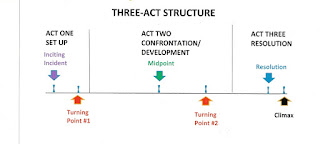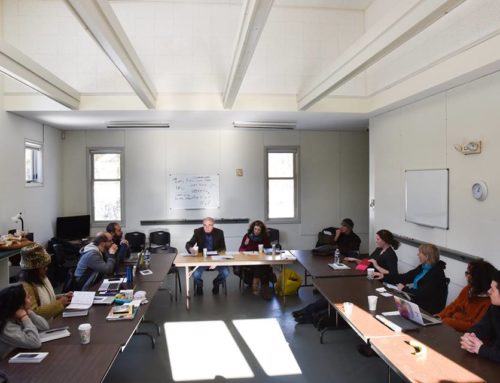One of the danger areas I’ve come across with the writers I work with is the understandable urge to get into draft as quickly as possible. As storytellers this is a natural inclination–“let’s get on with it already; enough backstory prep work and plot outlining; I want to start turning out pages.”
Unfortunately what often happens when this urge is embraced is that an extraordinary amount of time is spent working and reworking Act 1 without having a clear and consistent focus on the overall structure of the story being told. And what happens is that there is not the full awareness of what needs to be established in Act 1 that must later pay off in Act 2 and especially in Act 3. In other words, what I often see happening is that the entire story is not kept front and center as the writer immerses him/herself in those opening 25-30 pages, getting lost in trying to perfect the beginning of a script while losing sight of the whole.
I’m not suggesting that surprises shouldn’t happen as you plunge into draft. In fact, you want them to. And at times they shed enormous light on what your story is really all about. But it’s my contention that if you discipline yourself to constantly keep the whole story structure in mind as you work on your Act 1–especially what you want happening in Act 3–you’re almost always way ahead in the game.
Always keep in mind that Act 1 functions as the “set up” for the rest of your story–preparing the way for your tale to unfold–introducing characters (especially your central character), establishing and enhancing the central character’s main want and need which in turn creates his/her dilemma or quest, triggering your inciting incident that launches the dominant story to be explored, establishing the world of the story, etc. etc. However, none of these elements can possibly be invented successfully from a structural standpoint without knowing what the main arc of the story is and especially where that arc ultimately lands in Act 3.
All I’m saying is that as you work on your Act 1–either creating the plot outline for it or actually writing pages–always keep in mind your whole story structure and especially your overall final destination. Otherwise, as the old saying goes, you run the risk of not being able to see the forest through the trees and some or all that initial work on your Act 1 may end up being in vain.
I’m the Program Director of the low-residency MFA in Writing for Stage and Screen being offered by the New Hampshire Institute of Art. Our last residency just ended, running from January 6-15, and we are currently accepting applications for starting the program with our June 2017 residency running from June 22-July 2. I’m also a playwright and screenwriter, producing partner in my production company Either/Or Films (The Sensation of Sight and Only Daughter) a professional script consultant, and the author of The Playwright’s Process.







Thank you very much for this insightful information, Mr. McLaughlin